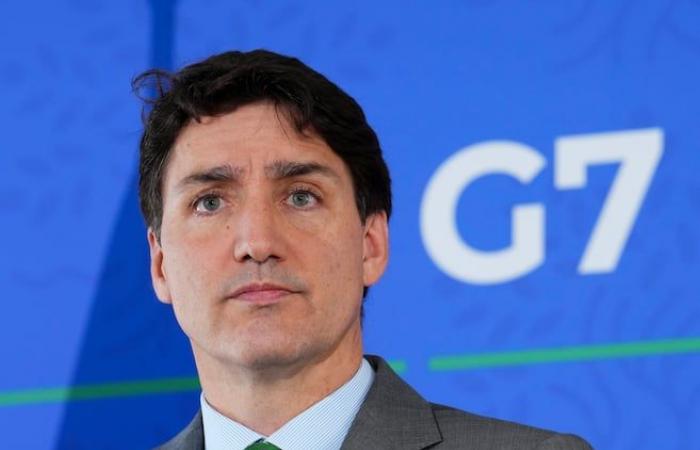Here’s a look at what it means to host the G7 and what’s at stake.
What is the G7?
The G7 includes the United States, France, Germany, Japan, the United Kingdom, Italy and Canada, as well as the European Union. For 50 years, the group’s governments have coordinated how liberal democracies respond to economic and societal challenges.
The G7 has no charter, offices or permanent administration. It makes decisions based on consensus, without formal voting.
The rotating presidency involves a series of meetings in the host country for senior officials from G7 countries, who coordinate policies ranging from defense to digital regulation. Some meetings involve civil society groups, business leaders and unions.
The welcome concludes with a leaders’ summit, where heads of government come together to take stock of key global challenges. This often culminates in a communiqué that sets the tone for other industrialized democracies and can shape global policies at the United Nations.
Canada joined the group in 1976 and this year will chair its meetings for the seventh time. Ottawa plans to host the leaders’ summit June 15-17 in Kananaskis, Alberta.
Canada is also known for the University of Toronto’s G7 Research Group, an independent project that monitors countries’ compliance with their G7 commitments.
Russia was a member of the group from 1997, making it the G8, until the other members expelled Moscow in 2014 for invading Ukraine.
Why be part of the G7?
US National Security Advisor Jake Sullivan has called the G7 the “steering committee for the free world” in 2022.
Senator Peter Boehm, a former diplomat who played a central role in Canada’s participation in the G7 for decades, said it was a vital tool for Canada to exert influence and protect its economic interests and security. “Our participation in the G7 is potentially the crown jewel of our foreign policy.”
The group originally focused primarily on economic issues. However, the rise of countries like China and India has prompted the G7 to focus on the rule of law, human rights and open markets.
The G7 also encourages projects, such as a Canadian-led monitoring service that observes how adversary countries spread disinformation, including through social media during general elections.
When hosting the G7, countries often launch a “flagship initiative,” typically a multi-year development project that receives significant funding from peer countries.
Canada last hosted the summit in 2018 in the Charlevoix region of Quebec, where the Liberals mobilized nearly $3.8 billion for the education of women and girls in crisis and of conflict. In Huntsville, Ontario, in 2010, the Conservatives promised $1.1 billion for maternal health and asked peer countries to devote part of their aid budget to this cause.
Senator Boehm argues that summits feature “frank, spontaneous discussions among leaders” that help them get on the same page, “despite the almost universal skepticism of new participants.”
What issues is Canada focused on?
Global Affairs Canada has so far only said Canada will advance “shared priorities, such as building economies that work for all, combating climate change and managing rapidly evolving technologies.”
Prime Minister Justin Trudeau has pledged to support research projects into how artificial intelligence can be used without undermining human rights and democratic values, and said last week he would champion ” peace and freedom for Ukraine.
He is expected to stick to some of Canada’s top global priorities, including supporting Ukraine, combating foreign interference and reforming financial agencies like the World Bank so they can better serve countries in need. development.
Mr. Boehm said Mr. Trudeau could try to strengthen support for the World Health Organization (WHO) or join calls for reform of the institution. U.S. President-elect Donald Trump has sought to withdraw from the agency, although it could be crucial in combating a bird flu pandemic.
Civil society groups have proposed other priorities, such as mobilizing Western countries to confiscate Russian assets to finance Ukraine’s war effort, and reversing cuts in foreign aid spending since the COVID-19 pandemic. COVID-19 that have hampered progress in eradicating major diseases.
Former Foreign Affairs Minister Lloyd Axworthy and others have argued that Canada should revive a 2002 initiative to reduce stockpiles of chemical and nuclear weapons. Mr Axworthy said it could help put in place safeguards to prevent countries using nuclear energy from acquiring nuclear weapons.
“I think this opportunity with the G7 is a chance for Canada to regain its footing and become an effective diplomatic actor in the world. I think we let a lot of things fall along the way,” he told the Global Exchange podcast, published by the Canadian Global Affairs Institute last October.
What will the year look like?
As host last year, Italy organized no less than 24 meetings between March and November 2024, ranging from a meeting for tourism ministers to another on science and technology.
Boehm said Canada would likely hold fewer meetings and pair them together, perhaps holding side meetings between foreign and defense ministers in one city and then a joint meeting. He said Ottawa did this last time to limit high security costs.
“The challenge for Canada will be to find the right moment and to know how this fits into our political and electoral calendar, but also to know what type of initiatives to put in place, where a consensus can be reached,” he said. said Mr. Boehm.
The schedule has already been a challenge for Ottawa. Last year, Mr. Trudeau failed to host the North American Leaders’ Summit, which people like Mr. Boehm attribute to a complicated schedule amid election periods in the United States and Mexico.
First, Canada will have to decide who to invite to the summit. Canada’s 2018 summit included leaders from island nations who discussed the impact of climate change and plastic pollution in the oceans.
South Africa separately chairs the G20 this year, a much larger group that has far less consensus than the G7. Mr. Boehm said it would be “very smart” for the country to be represented in Alberta. South Korea has said it wants to join the G7 as a permanent member.
Et Donald Trump?
The last time Canada hosted the G7, Donald Trump overshadowed the leaders’ summit during his first administration by refusing to sign the communiqué. He left earlier than expected and blasted Mr. Trudeau as “very dishonest and weak” in a dispute over tariffs.
Mr. Boehm said the communiqué required two late nights of negotiations because the Trump administration has not aligned with others on climate change or how to prevent Iran from arming itself. nuclear.
He noted that some summits end with the host country issuing a statement summarizing the negotiations if countries fail to reach consensus, something he said Canada avoided last time.
Mr. Trump’s return to the White House this month has cast new uncertainty over the G7, given his preference for striking bilateral deals rather than working in multilateral groups.
Mr. Boehm says the G7 is much more important to Canada than the United States, and that Ottawa needs to coordinate with anyone in Mr. Trump’s inner circle, especially if he continually replaces his core team.
Separately, Canadian immigration lawyers said Mr. Trump has been technically barred from entering Canada since a New York court convicted him of a criminal offense last May. This means he may need special authorization from Ottawa to enter the country.
What about the chaos in Ottawa?
Before last month’s political turmoil, Mr. Trudeau had repeatedly discussed his impending role as chair of the G7 summit in June, leading observers to believe he would do his best to keep his minority government in power until the fall.
Yet the surprise resignation of Finance Minister Chrystia Freeland and the resulting unrest within the caucus could lead to Mr. Trudeau’s ouster with a vote of confidence, sending Canadians to the polls.
If Mr. Trudeau does indeed chair the G7 summit in June, he will be the longest-serving leader among his peers, Mr. Boehm noted. “He will have an idea of what he wants to accomplish and what issues and themes are most relevant.”
Mr. Boehm added that he had “full confidence” in Canadian officials to succeed in their mandate at the G7, whoever the prime minister is.






